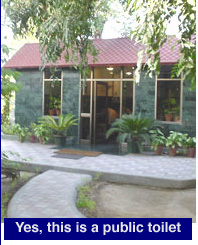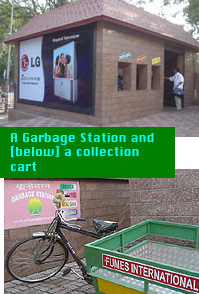Money from Shit
This is an interesting article from www.goodnewsindia.com. Read it to believe it.
Let's face it: for all the many things we Indians can be justly proud, we do suffer from an incompetence when it comes to sanitation. Some would even judge us a vicious society. After all, have we not for centuries expected a whole caste of fellow Indians to clean up after us? How little we train our children in toilet use. How terrible our public --and frequently, even private-- toilets are. How shoddily we design, build and maintain them. Gandhi, wise as he was to Indians' ways, chastised us and urged us to clean our own latrines. Alas, to little avail. The best groomed Indian often leaves a wrecked toilet behind. It is not surprising that we are a laughing stock around the world in this regard. Truth is, we have an uncomfortable, unprocessed mind mess when it comes to toilets and our responsibility towards them. Now at last we have an Indian, who is aware of this problem; who is proud of creating and maintaining sparkling public toilets. If Fuad Lokhandwala is emulated widely, there is hope yet, that we will correct a gross flaw in our collective outlook.
A Jay Leno jibe:
The year was 1998. India had thumped its chest and declared itself nuclear. Indians brimmed with pride. The world reacted with anger, threats and sanctions. All that flew over the heads of gleeful Indians. Fuad too was euphoric-- but he stopped dead in his tracks one day, while watching a Jay Leno Show on TV. The burly wit had said something to the effect, "Indians can build nuke bombs but they can't build decent toilets." It hurt. And yet, as with the best of humour, how true!
Fuad was in his forties and had spent 25 years of his life in the USA, as a student and as a professional. "I loved it there -- the energy, the systems, the order. I longed for India to be up near there someday," he says. "It puzzled me as to what we lacked. What was it that we must get right?" Back in India he had not quite settled down to life in Delhi. He was unsure as to what he should be doing. A routine 'job' made no sense.
What he didn't quite know about himself was that he was a Yankee style entrepreneur. Jay Leno uncorked that. Fuad's obsession began that moment: "I will build world class public toilets!" It is obvious that such a resolve would invite ridicule in India. His loving wife Mehru and daughter Sanaa were 'deeply concerned'! But an obsession must run its course.
Not 'pay', but 'paying' toilets:
After six months of trying to sell his 'crazy' vision, Fuad had the ears of K J Alphonse, an activist bureaucrat. Alphonse was apprehensive but nevertheless took him to 'his minister', Jag Mohan. Fuad had their attention. Yes, it was time we built toilets we need not be ashamed of, but how would we fund them. It was one thing to get New Delhi Municipal Corporation [NDMC] or Delhi Development Authority [DDA] to permit him to build his dream toilets, but where would the money come from for maintenance and as return on investment? After all, you can't load on the user all that it costs to build and run.
Fuad knew he had a hurdle. Given his specifications, each of his dream loos would cost Rs.10 Lakhs. And that is big money in India. He sat with his indulgent wife and daughter and discussed the deadlock. Suddenly Mehru said, "Hey, if it's going to be upmarket, why don't you get upmarket advertisers to support it?"
In a few days, Fuad had made a model, prepared a business plan and a formal request that said more or less, "just give me the permission and I will provide a service India can be proud of". He got the permit. He reminisces now: "Yes, it's not simple in India. But doors do open for those that are sincere. Most of the time our bad mouthing the Indian system, is to do with our tendency to seek alibis. I found a receptive bureaucrat and a politician who backed me."
The Great Wall of Ads:
But no one was going to give him money to build a loo. He formed Fumes International Company, and decided to put his own savings on the line. "If I am an entrepreneur worth my salt I must take risks," he told himself. He began to build his definitive toilet in one of Delhi's in-places - Khan Market. He lavished all his care and attended to every detail. Mehru an interior designer was with him the whole way. It was not to be just a tucked away loo, but a high profile object of style. When it opened in late 1999, it was a hit at once. Almost always in India, we build great edifices but pay little attention to how we would maintain them. Fuad was firm from the beginning: "my toilets have to be inauguration clean forever." He had spent time in planning maintenance, training his staff and they paid off.

After five years they are spotless. Two attendants clean after every use. A watchman guards it between 10 pm and 7 am. Visitors are delighted. An affluent lady says she uses it all the time. Bernie Fernandes, a working woman says, "I feel so safe, relaxed and comfortable." A highly impressed Robert Kinfarley, the head of World Health Organisation [WHO], in Delhi sent his staff to Fuad's toilet for training. Clearly user endorsement was gathering. Visitors are charged a token Rs. 1 and Rs.2, just to induce a sense of responsibility.
Though it took him over six months trying to persuade advertisers to support him, he was certain he had a USP: foot falls of the spending kind. Early mind blocks were blown away. Big names were eager. Fuad's toilet walls are not cheap to advertise on. The income from ads enables him to pay great wages, make a nice profit and build more toilets. He has 11 in Delhi so far, in places like Connaught Place, Lodi Gardens, Sundar Nagar, Golf Links etc. Each is a unique piece with marble, granite, chrome, plants, aquarium and above all with that heavenly peace that reigns in great washrooms. Fuad is forever making the rounds. Are the sills clean? Is the soap in the right place? Is the plumbing drip free? He's a perfectionist.
Now to garbage:
There is some concern now that his business model is stoking greed and quick grabbers are moving in. Fuad is worried that the idea of cost free, public sanitation may lose out if cronyism creeps into city administration. There are now about 80 toilets based on the Fuad model. He hopes all would pay attention to upkeep. But there is a built-in safeguard in the idea he has pioneered: if a toilet is run down, it won't attract advertisers.

Fuad is now attempting to make garbage pay. He has built collection and sorting centres where again advertising will pay for the process. He admits it's not a commercial success yet. And he has begun to ponder what else he should be doing to improve India's image in terms of public sanitation. So the question arises, what about toilets for the poor and for small towns? This questions has been asked in the past and almost always been answered wrongly. Tokenism has ruled and subsidies and handouts have steadily been siphoned off. In the end the poor get unusable toilets.
Fuad says, let entrepreneurs in and they will create the right commercial product. Has not C K Prahlad, the management guru said that Indian entrepreneurs are ignoring the huge market of the poor that exists in India? Bottom up planning is good when you are talking of livelihoods. When it comes to behavioural changes, the process is always from top to down. Given TV, travel and visible changes in the cities, the poor --whether or not you like it-- wish to ape the rich. Computers, education, mobile phones, grooming, and lifestyles are being mimicked. Why not toilet habits?
So how do you build toilets for slums and small towns without subsidies? Fuad has a brilliant idea: build quality spaces but to offset for the fact that premium advertising may not be forthcoming, run a shop attached to the toilet! He is yet to try out but is sure it will work. It would need of course new thinking on the part of local governments.
Coming from the centre:
Fuad Lokhandwala's life has run a zig zag course. Born affluent, he grew up lonely and determined to make it on his own. "My marriage to Mehru was the turning point in my life. She was 18 and I, 20. Through her I came to know --and to deeply admire-- her family, especially her father, R H Chisti, IAS. He was by inclination a saintly man. That he was a direct descendant of the Khwaja, Moinuddin Chisti of Ajmer probably explains that. Through Mehru too I have Sanaa, my daughter and my passion. And now I have this mission. I ascribe all I have achieved to Mehru," he says dreamily.
An affluent man, a happy, family man, Fuad could have done tens of other things with his time. But India got lucky because Jay Leno made smoke come out of Fuad's ears. By the way, was that why he called his company Fumes? "Naaw," he drawls with a wink. "It stands for FUad, MEhru and Sanaa."


1 Comments:
Good one ... How about some such discpline even in the top notch corporate restrooms?
Post a Comment
<< Home